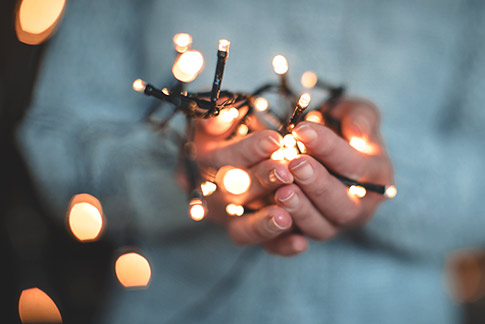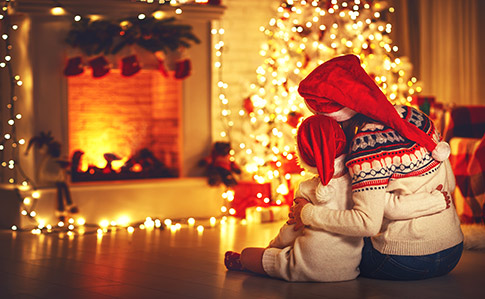Fire prevention: Safety tips for the holiday season

While the holiday season is a time for celebration, it’s also a busy period for fire departments. Discover our safety tips to prevent fire hazards.
Indoor Christmas ornaments and decorations
Christmas trees, artificial and natural
Artificial Christmas trees are generally considered less flammable than natural ones. If you choose a natural tree, avoid setting it up too early. Natural trees should not be kept for more than two weeks. Install it in a solid support, away from heat sources, and water it regularly to keep its base wet.
Christmas lights and light strings
Look for CSA- or ULC-certified light strings and LED bulbs, as they are more energy-efficient and generate less heat. Carefully inspect cables and extension cords for any signs of damage. Don’t connect more than 3 strings of lights to the same extension cord to prevent electrical overloads. Ensure that electrical wires are not tangled, and that they do not run under carpets or between doors, as this can damage them and cause overheating or short-circuiting. Preferably, use a timer or remember to turn off your Christmas lights before going to bed or leaving home.

Candles and tapers
Place candles (scented or unscented) and tapers in stable, non-flammable holders. Place them away from Christmas decorations and gifts, clear of passageways, and never leave them unattended, especially when there are children or pets around.
Hazard-free cooking for the holidays
Stove and oven
On average every year in Quebec, nearly 20% of residential fires with losses are sparked by cooking appliances. Avoid distractions while cooking, keep pots and pans under supervision, and children and pets out of the kitchen. Use a timer, and don’t wear loose clothing, more likely to result in accidents.
Traditional and electric fondue sets
Place fondue pots on a stable, heat-resistant surface, preferably using gel fuel (instead of liquid) to prevent any spillage. Never add fuel to a burner that is still hot; use another burner instead. Do you need to replace your fondue set? Consider an electric model, which is safer, and tie the power cord around a table leg to avoid hazards.
Cooking fire
In the event of a cooking fire, cover the flames with a lid or damp cloth to cut off the air circulation. Do not attempt to extinguish the fire with water or turn on the hood, as the resulting airflow could help spread the fire. Never move the source of a cooking fire (burner, cooking vessel, etc.). Keep your kitchen extinguisher within easy reach. Call the fire department even if the fire seems to be extinguished.
Testing smoke alarms and fire extinguishers
Check or replace the batteries in your smoke detectors twice a year (make a habit of doing this at time changes). Install at least one smoke alarm per floor, including one near the bedrooms, kitchen and electrical panel. Acquaint yourself with the proper use of your fire extinguisher and stow it in an easily accessible location. Don’t use it in the event of a major fire or when the room is filled with smoke. Instead, leave the premises and call the fire department.

A home insurance policy to properly protect you
Home insurance usually covers unintentional poperty damage caused by household fires (excluding the property at the origin of the loss). Make sure that you have adequate coverage and adjust it as needed, for instance, if your situation changes, if you renovate, acquire a fireplace, and so on.

Protect your home
See how CAA-Quebec Home Insurance can meet all your needs.